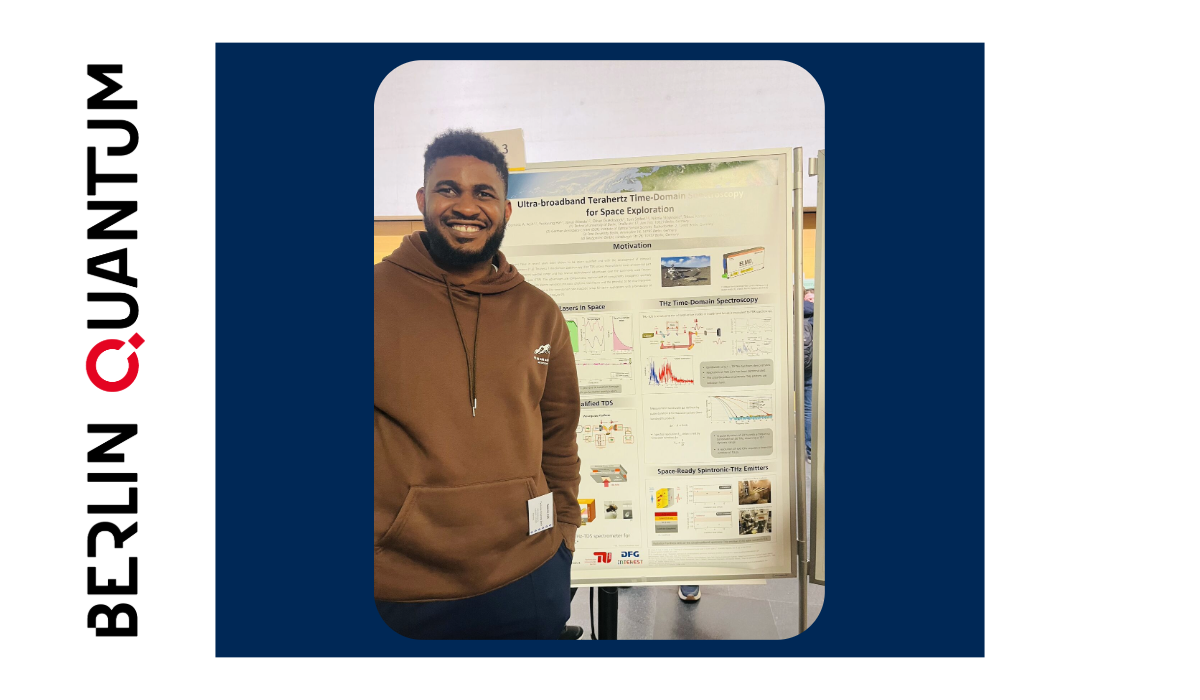In this interview, we talked to Dominic Arinze Azih from Technische Universität Berlin and DLR WR about his work on Terahertz Time Domain Spectroscopy for space exploration. He shares how Berlin’s collaborative quantum research landscape supports his project, and reflects on the city’s scientific heritage, vibrant community, and the future of quantum technologies.
What inspired you to pursue a career in quantum physics?
Quantum physics is at the forefront of many modern technologies, including lasers, and I have a strong background with my master's in Lasers and Photonics. This has sparked my interest and given me the opportunity to pursue my career in this interesting and evolving field.
Why did you choose to conduct your research in Berlin?
Berlin is a big city with a very rich history, especially scientifically, with lots of renowned physicists walking through the streets of Berlin and performing some ground-breaking research too. Berlin is also very international and multicultural.
What advantages does Berlin offer for quantum physics research compared to other cities or countries?
A close network of many research institutions and universities with many leaders in quantum research makes collaborations effective and fun.
Can you tell us about a current project or experiment you are working on?
I am currently working on developing a chip-integrated Terahertz Time Domain Spectroscopy for space exploration. We aim to have a compact time domain system with fewer bulky elements for space exploration.
How does BERLIN QUANTUM and the Berlin research landscape support your work, and which resources are particularly helpful?
Of course, as earlier mentioned, close collaboration has been the most helpful resource from BERLIN QUANTUM. I have also been able to use the Spintronic emitter developed by a BERLIN QUANTUM group for my research.
What role does collaboration with other scientists and institutions in Berlin play in your research?
Collaboration has been key in my research, from sharing ideas, brainstorming, to actual joint projects that impact my research positively.
How does living in Berlin influence your personal and professional development?
It has impacted positively in my life — from the exceptional scientists I get to meet and work with to the historical sites I get to visit with family. Berlin has been a fun city to work and live in.
In your opinion, what are the most exciting developments or trends in quantum physics that we can expect in the coming years?
I think the exciting trends are the race to build scalable quantum computers that will move from lab prototypes to real-life applications.
Do you have a special experience or anecdote from your time in Berlin that you would like to share with us?
I have had lots of special experiences in Berlin, both personally and professionally, but worth mentioning are the nice networking events organized by BERLIN QUANTUM.
What advice would you give to young scientists who aspire to a career in quantum physics and might consider coming to Berlin?
Berlin is the right city for you. A mix of professional competence with a nice multicultural and international feeling will make it an interesting career. Berlin is also a leading city in quantum development, and therefore there are many such organizations and events for networking among the quantum community.
More information.

